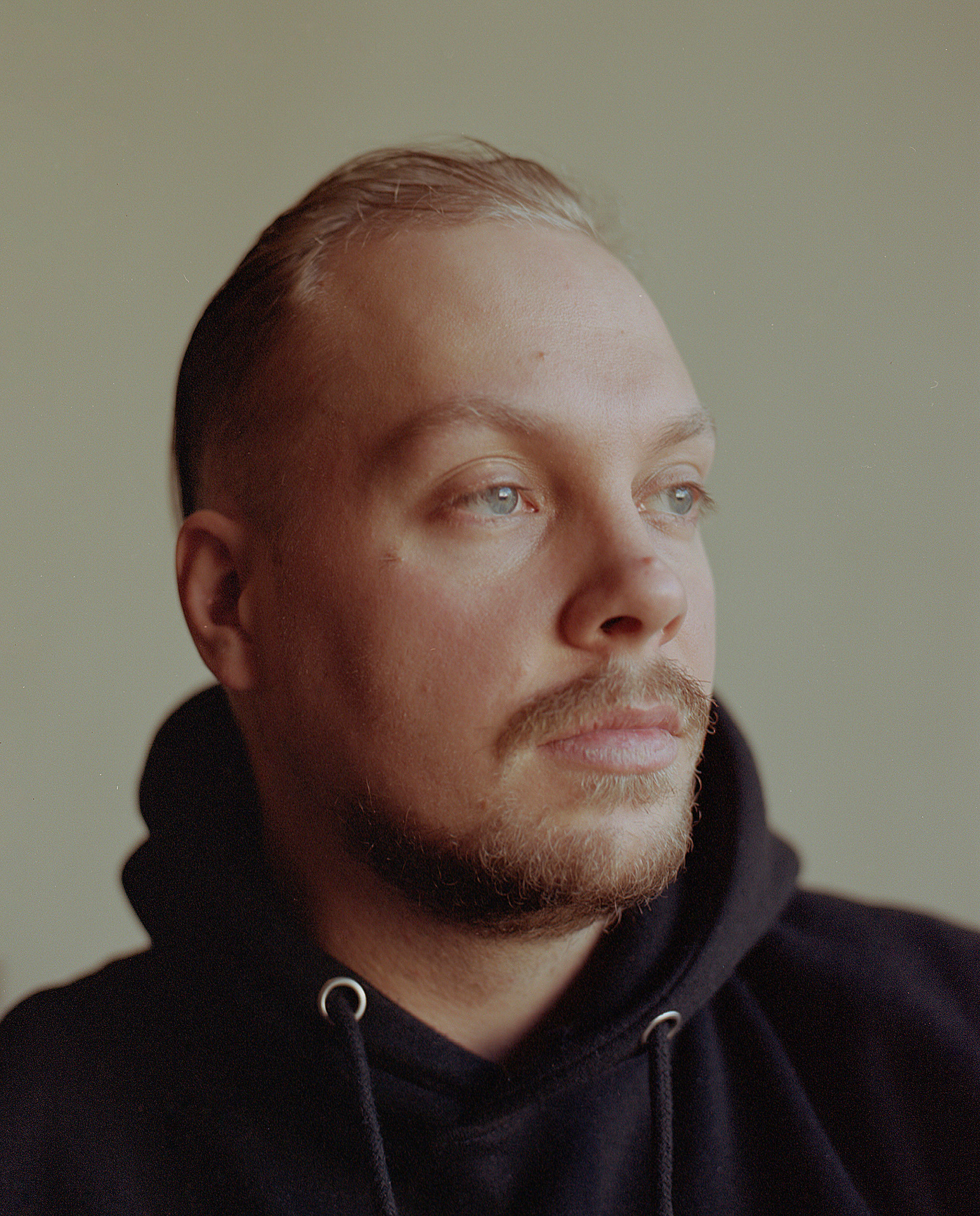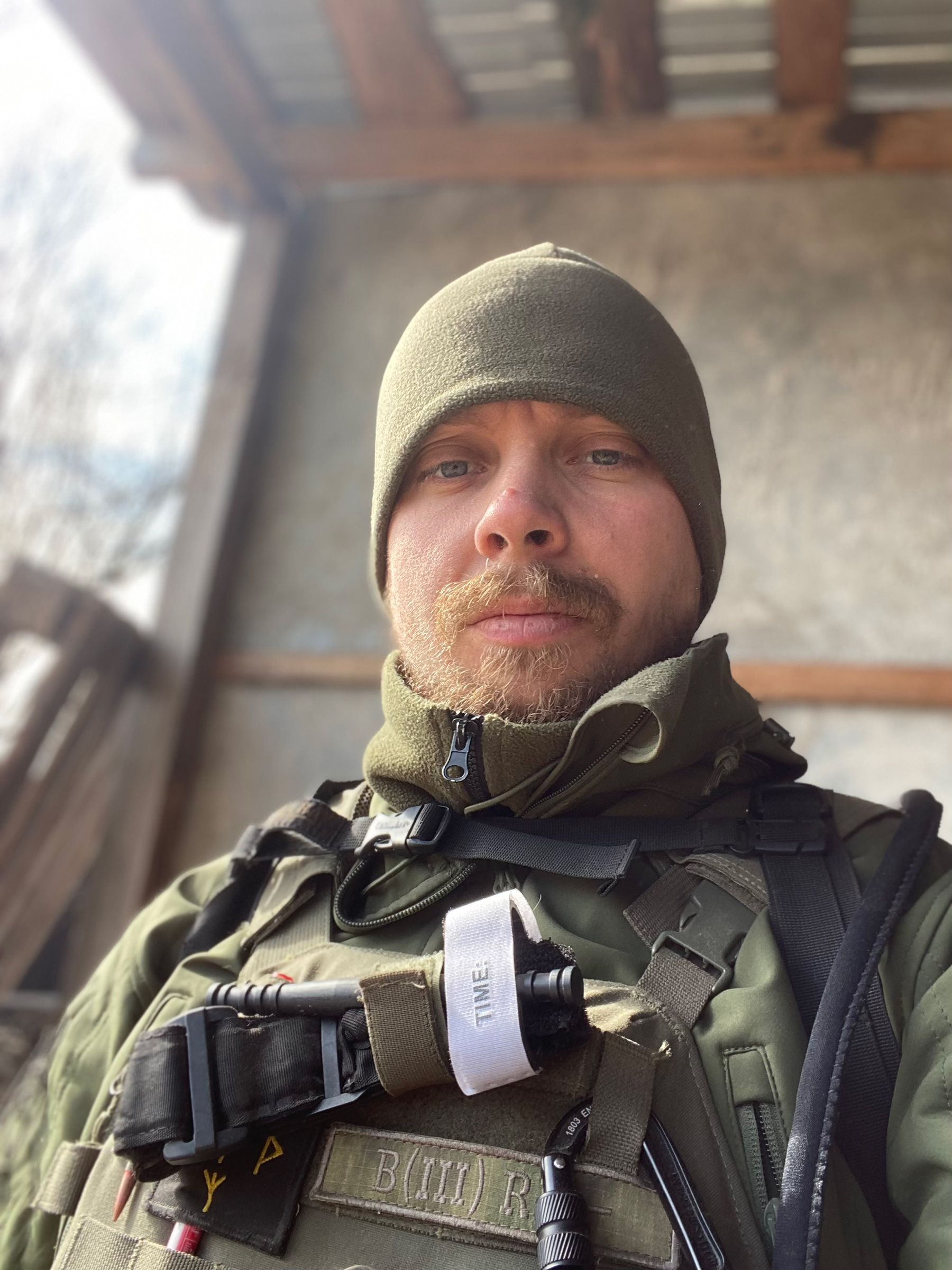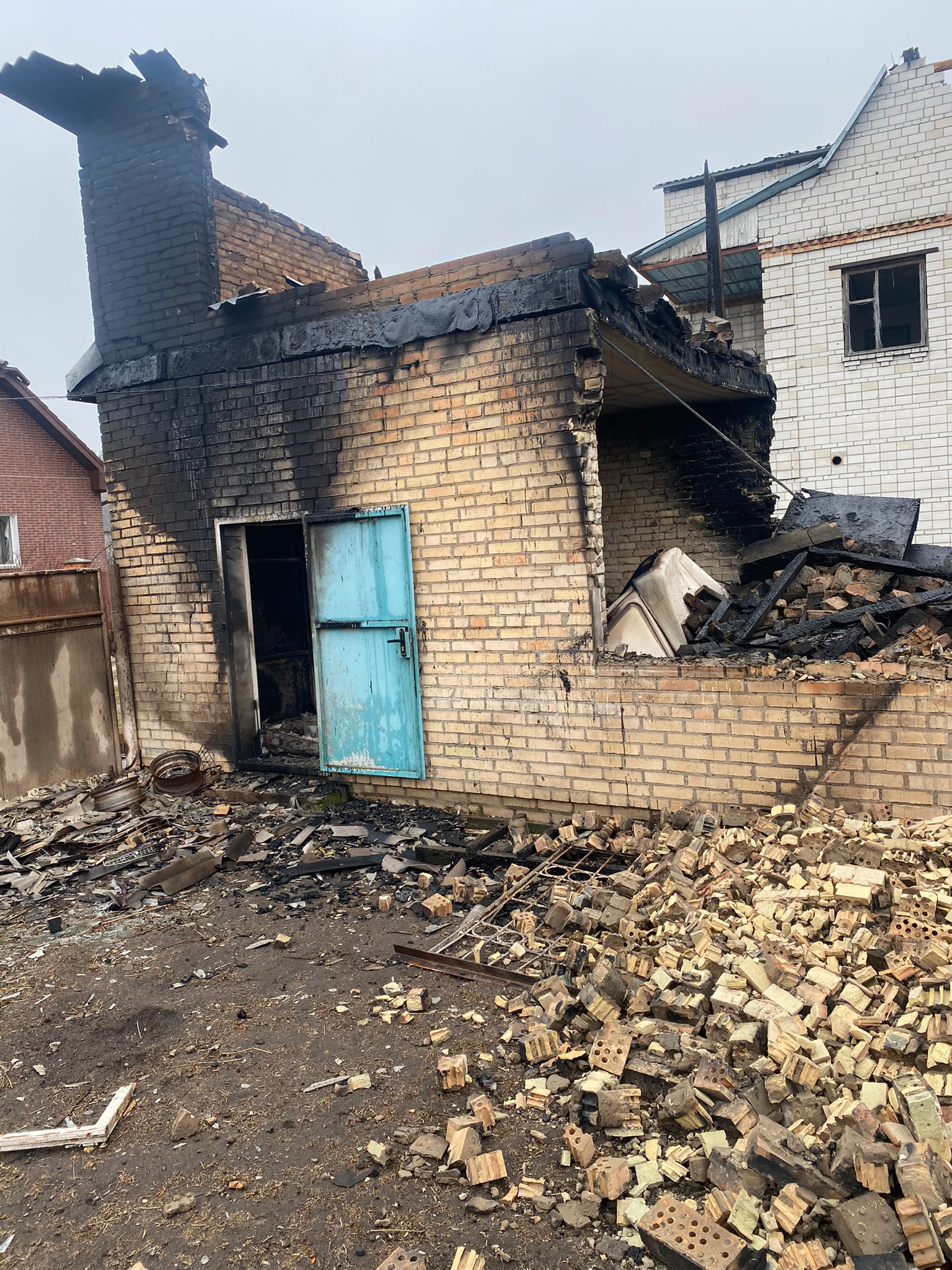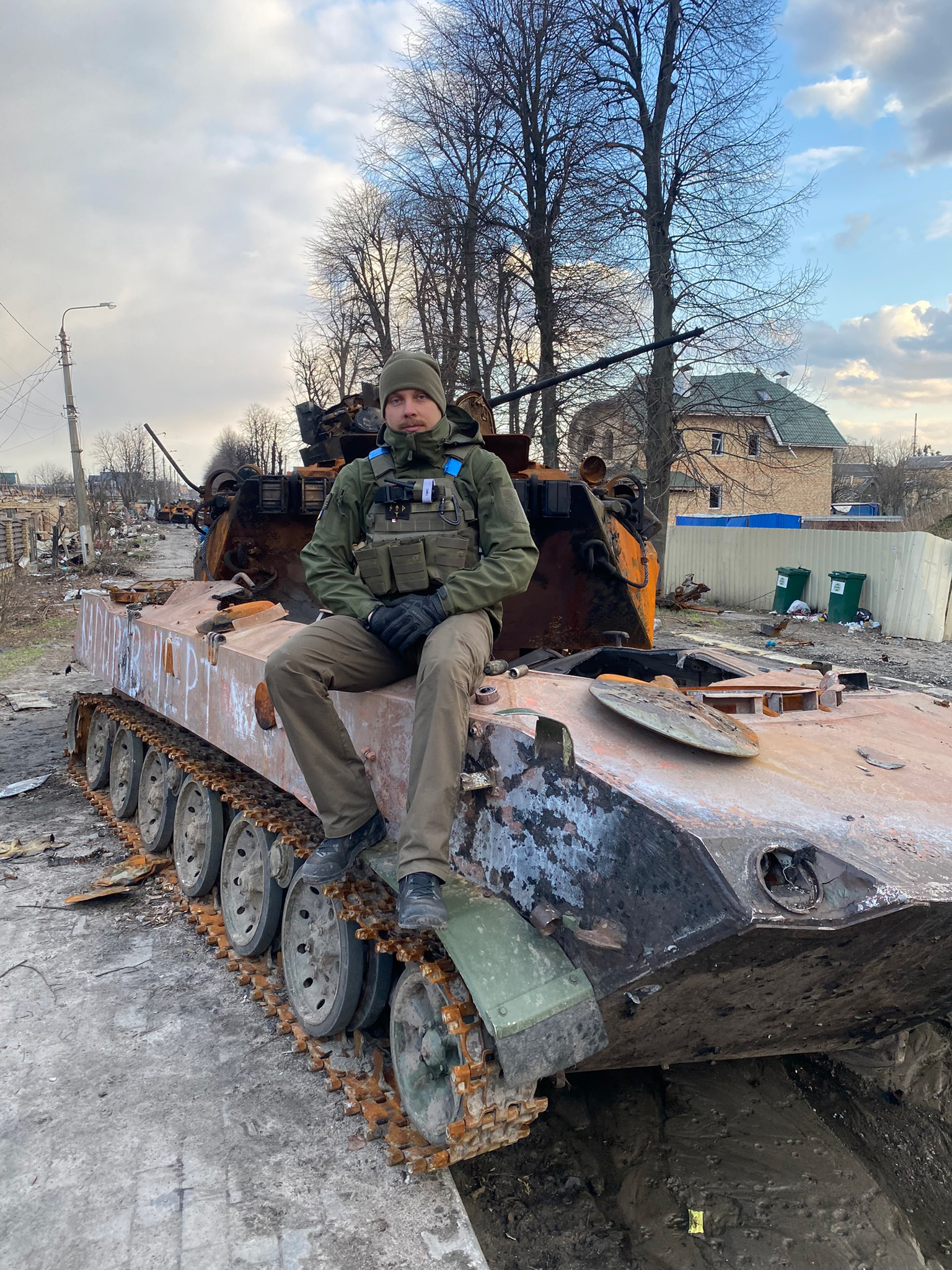
TIME first met Povilas Limontas outside the Ukrainian embassy in Vilnius, Lithuania a week after Russia invaded Ukraine. The bartender, then 24, had left his home in Kaunas, and taken the train that morning so that he could register as a volunteer fighter. An orphan with a strong sense of moral duty, he had felt that “it would be selfish” not to go.
Even with registration papers in hand, it took him a while to figure out how exactly to get Ukraine; in the end, he traveled with a fellow Lithuanian who was running humanitarian aid to the country, and returning with refugees. He tried and failed twice to cross the border. One attempt turned out to be a blessing in disguise: had he not been turned away, Limontas would have been at the international training center outside Lviv when Russia bombed it on March 13, killing 35. After he was finally admitted to the country in mid-March, he eventually made his way to Kyiv along with some fellow volunteers from the Czech Republic and Sweden. There, as a unit, they were assigned to support the Territorial Defense Forces. Over the coming month, they would see about two weeks of combat, and witnessed the atrocities in Bucha after it was liberated.
His assignment over, Limontas arrived back at his home in Kaunas, Lithuania on April 7. He is debating whether to return to Ukraine. Limontas spoke to TIME’s Lisa Abend on April 17.

We spent about four days at the central military base where we were given our weapons–an AK47. There was training for people who were green, but we weren’t, so we told them to give us some targets and 10 or 20 shots to warm up with so we could get familiar with the gun. And that was it; we were good to go. One thing that I liked was that no one asked, “Why are you here?” Everyone understood that I was there to fight against evil.
We saw our first action about two weeks after arriving in Ukraine. We were bodyguards for someone important who was visiting the front and the two of us with the most experience went to the front in Irpin [a city northwest of Kyiv]. That was intense. In Kyiv there had been alarms whenever the rockets were coming. There were long periods with no sirens, and when they came, you still had time to go to a shelter, hide, smoke a cigarette. But in Irpin, there was no silence, there was no 20 seconds in between the siren and the explosion. It was just bombs coming all the time from right and left—and dangerously close, about 400 meters from where we were.
Read More: Meet the Foreign Volunteers Risking Their Lives to Defend Ukraine—and Europe
I went on a couple more of those bodyguard missions. During the third one, we had our first firefight. This was in Irpin, in the forest, and the enemy was about 200 meters away; they were trying to ambush the Ukrainians. We came in as reinforcements, and fired a bit, but after a little while, we had to run, because one thing I had learned in Lithuania is that if you’re in a firefight with Russians, you only have 10 minutes before they send in artillery. The fight lasted five or 10 minutes, but in my head it felt like five seconds.
Later, we spent nine days on a second frontline, defending a village near the river outside Kyiv. We were told that the village needed support, and that we were there to relieve some of the units already in place. As soon as we got there—in the first 10 seconds after we exited our vehicles—we were shelled. We fell down on our faces. The explosions were 200 meters, 100 meters away from us, and they just kept coming. It was right when we arrived, so there’s a good possibility we were targeted.
My best buddy was a Czech guy, and at first the two of us joked that it would be nice if we were still alive on the third day, because we were getting shelled so much that first night. Then, after a while, we were just hoping for one more day. We basically didn’t sleep the first night because every two hours we had to guide other guys to the positions in the trenches, and every time we got 50 meters from our shelter there’d be a whistle, we’d get down, and boom. I think I almost died four or five times just the first night. I got a little bit of shrapnel in the back of my helmet. It’s a small piece but that’s all it takes.
My closest brush with death came on the fourth or fifth day. We did shifts, filling in the gaps for territorial defense fighters. At about 8 a.m., I had finished my shift and was walking back to the shelter alone, which wasn’t very bright of me. I heard a whistle, but it wasn’t the normal kind of whistle, where it’s likely that you’ll live. This was a whistle that was very close, like a kettle boiling on maximum heat. My legs just collapsed, and I hit the ground and covered my neck. It exploded maybe 10 meters away; there was a house there and it was completely destroyed. Only one brick wall was left, and that is what saved me. If the artillery had hit on the left side instead of the right, I’d be gone.

Before I left Lithuania, I had said that if a rocket was wasted on me instead of children, I would take that deal. Well, it wasn’t one or two rockets. Hundreds were wasted on me in those 9 days. And I lived, so it turned out to be a good deal.
On the seventh day, the Ukrainians told us they were retaking the city of Stoyanka, close to Bucha, and they needed our support. They gave me a grenade launcher because I had been trained during my time in the Lithuanian army to use it. I don’t actually know how they managed to get one, but it was like getting a Christmas present.
When we were headed to Stoyanka, we knew there was a good chance we wouldn’t make it back home. So before we left, my Czech friend gave me a piece of paper with a phone number and said, “This is the phone number of my girlfriend. If I fall, you’ll have to call her.” I went numb for a second because I thought those kinds of moments only existed in movies. I responded by telling him that if I fell, he had to send the latest video of me to my friends. Then we just nodded to each other and went to work.
Read More: Ukrainians Are Speaking Up About Rape as a War Crime to Ensure the World Holds Russia Accountable
We expected huge resistance there, but it was nothing. So we helped clear the streets, working with the special police who were clearing houses and basements. The operation took maybe 10 hours, but at the end, the Ukrainians had taken the city. And then a few days later they posted that they had re-taken all of the Kyiv region.
The Ukrainians have so much spirit. Just looking at them gives you strength. They are not afraid, they share everything, they joke around, but also they are very sharp and willing to fight anywhere anytime. It’s impossible to win against a country like that.
When I think about the Ukrainian volunteers who joined the fight after the invasion started, the two words that come to mind are “stupid brave.” Ukrainians are stupid brave. Give them a gun and they will go fight. That can be good and bad, but it’s better to be motivated to fight without skill, than to have skill and be afraid to fight.
As for me, I wasn’t afraid. I didn’t feel anything while I was there. I didn’t let myself be guided by emotions. At one point we went to Bucha as protection for some journalists who were following Ukrainian soldiers as they collected the bodies. Literally everything that hadn’t been nailed down was stolen—they stole the ATMs, and cash registers from supermarkets. There was shattered glass everywhere, shrapnel from the artillery, animals shot. We went into a kindergarten complex that the Russians had used as a command post, and we went into the basement where they shot and executed people. The walls were red with blood. My boots stuck to the floor because the blood hadn’t dried yet.
Read More: A Visit to the Crime Scene Russian Troops Left Behind at a Summer Camp in Bucha
I didn’t have any emotion. I left all my feelings at home basically. But now that I’m back home, I feel like they’re catching up with me, these new feelings that I don’t know how to deal with. I’ve had a hard time understanding what happened. Because it doesn’t matter how strong you are. Your mind is not used to seeing violence like that.
Now that I’m back in Lithuania my mission is to go on every radio, talk show, newspaper possible. People get used to things like this and I need to remind them that the war is not over, and people still need support—in food, ammunition, and medicine. Five euros is still a donation and 5 euros can feed people like me for 5 days.
I don’t think my time in Ukraine changed my perspective on the world or on life. But I know that I didn’t come back the same as I left. What stands out in my mind is after we retook Stoyanka, when we went back to the village. I had been carrying 40 kilos of gear, and it was really hot and we had drunk all of our water. We hadn’t slept in 30 hours. We got back to the village, and slept and the next day, when we woke up, the frontline had moved very far away. The artillery couldn’t reach us. We were standing outside, smoking cigarettes, and there were no whistles, they were just gone. It was the first time in seven or eight days that it was safe to stand outside. It felt like we had made a difference and that my trip wasn’t for nothing. That was a very, very nice feeling.

We did our mission, and we defended the village. But I don’t consider it a victory. There had been 200 or 250 houses in that town, and there was nothing left. Maybe if you replaced the windows and the roof, you could live in a few of them. All the others were destroyed; I mean, there were only two bricks left. So we won, but at a huge price.
About 20 hours after the frontline had moved, the elderly people who lived in the village came back. There was this one old woman who was standing in front of her house, which looked like it had been cut down the middle—one whole side was completely blown off. She just let out this huge sigh. And then she went to her garden and started digging. I guess everyone has their own coping mechanism.
As told to Lisa Abend
More Must-Reads From TIME
- The 100 Most Influential People of 2024
- Coco Gauff Is Playing for Herself Now
- Scenes From Pro-Palestinian Encampments Across U.S. Universities
- 6 Compliments That Land Every Time
- If You're Dating Right Now , You're Brave: Column
- The AI That Could Heal a Divided Internet
- Fallout Is a Brilliant Model for the Future of Video Game Adaptations
- Want Weekly Recs on What to Watch, Read, and More? Sign Up for Worth Your Time
Contact us at letters@time.com